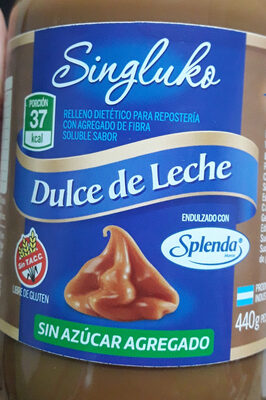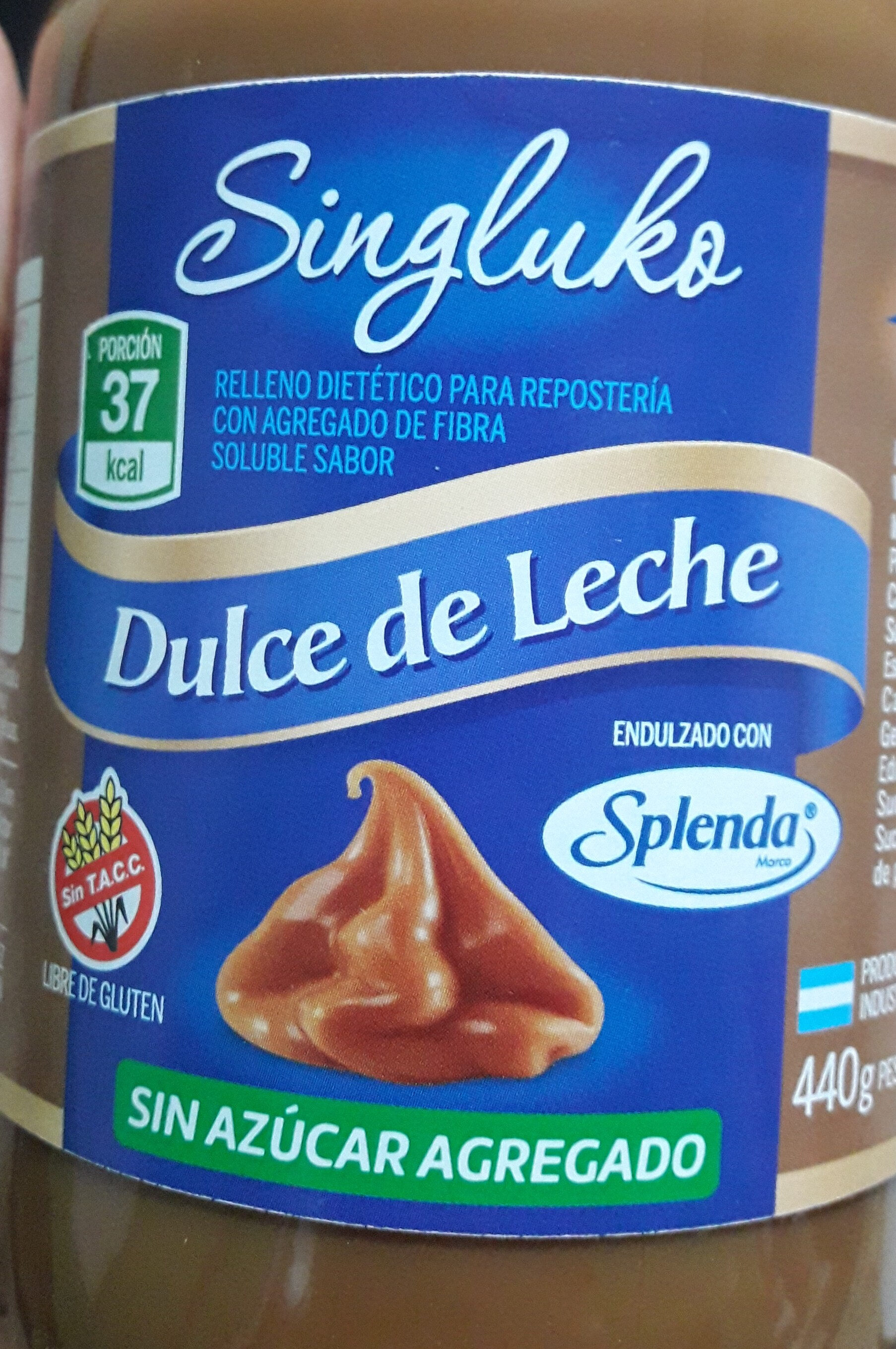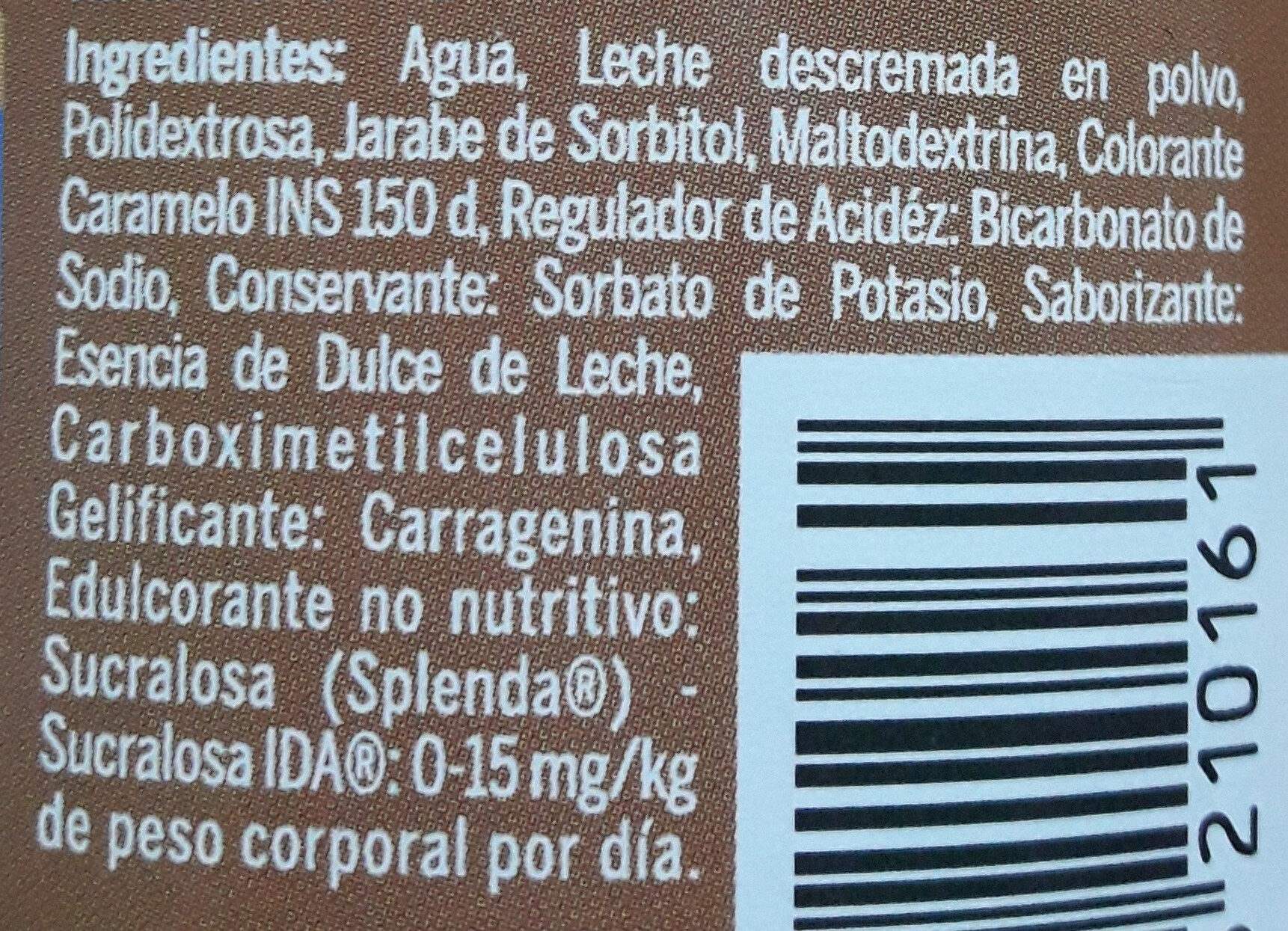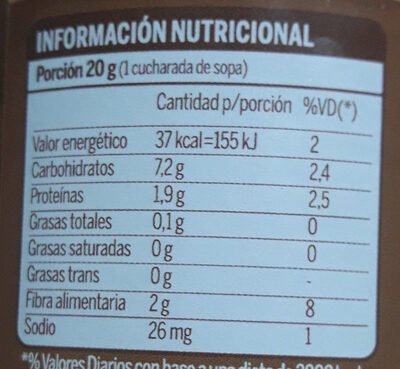Help us make food transparency the norm!
As a non-profit organization, we depend on your donations to continue informing consumers around the world about what they eat.
The food revolution starts with you!
Relleno dietético sabor dulce de leche - Singluko - 400gr
Relleno dietético sabor dulce de leche - Singluko - 400gr
This product page is not complete. You can help to complete it by editing it and adding more data from the photos we have, or by taking more photos using the app for Android or iPhone/iPad. Thank you!
×
Barcode: 7798033210161 (EAN / EAN-13)
Quantity: 400gr
Packaging: Glass
Brands: Singluko
Categories: Breakfasts, Spreads, Sweet spreads, Dietary supplements, Milk jams
Labels, certifications, awards:
No gluten, es:Sin TACC
Origin of ingredients: Argentina
Manufacturing or processing places: Santa Fe
Stores: dietética
Countries where sold: Argentina
Matching with your preferences
Health
Ingredients
-
15 ingredients
: Agua, leche descremada en polvo, polidextrosa, jarabe de sorbitol, maltodextrina, colorante caramelo (INS 150 d), regulador de acidez, bicarbonato de sodio, sorbato de potasio, Esencia de Dulce de Leche, Carboximetilcelulosa Gelificante, Carragenina, SucralosaAllergens: Milk
Food processing
-
Ultra processed foods
Elements that indicate the product is in the 4 - Ultra processed food and drink products group:
- Additive: E150 - Caramel
- Additive: E150d - Sulphite ammonia caramel
- Additive: E407 - Carrageenan
- Additive: E420 - Sorbitol
- Additive: E466 - Sodium carboxy methyl cellulose
- Additive: E955 - Sucralose
- Ingredient: Colour
- Ingredient: Maltodextrin
Food products are classified into 4 groups according to their degree of processing:
- Unprocessed or minimally processed foods
- Processed culinary ingredients
- Processed foods
- Ultra processed foods
The determination of the group is based on the category of the product and on the ingredients it contains.
Additives
-
E1200 - Polydextrose
Polydextrose: Polydextrose is a synthetic polymer of glucose. It is a food ingredient classified as soluble fiber by the U.S. Food and Drug Administration -FDA- as well as Health Canada, as of April 2013. It is frequently used to increase the dietary fiber content of food, to replace sugar, and to reduce calories and fat content. It is a multi-purpose food ingredient synthesized from dextrose -glucose-, plus about 10 percent sorbitol and 1 percent citric acid. Its E number is E1200. The FDA approved it in 1981. It is 0.1 times as sweet as sugar.Source: Wikipedia
-
E202 - Potassium sorbate
Potassium sorbate (E202) is a synthetic food preservative commonly used to extend the shelf life of various food products.
It works by inhibiting the growth of molds, yeast, and some bacteria, preventing spoilage. When added to foods, it helps maintain their freshness and quality.
Some studies have shown that when combined with nitrites, potassium sorbate have genotoxic activity in vitro. However, potassium sorbate is generally recognized as safe (GRAS) by regulatory authorities.
-
E407 - Carrageenan
Carrageenan (E407), derived from red seaweed, is widely employed in the food industry as a gelling, thickening, and stabilizing agent, notably in dairy and meat products.
It can exist in various forms, each imparting distinct textural properties to food.
However, its degraded form, often referred to as poligeenan, has raised health concerns due to its potential inflammatory effects and its classification as a possible human carcinogen (Group 2B) by the International Agency for Research on Cancer (IARC).
Nevertheless, food-grade carrageenan has been deemed safe by various regulatory bodies when consumed in amounts typically found in food.
-
E420 - Sorbitol
Sorbitol: Sorbitol --, less commonly known as glucitol --, is a sugar alcohol with a sweet taste which the human body metabolizes slowly. It can be obtained by reduction of glucose, which changes the aldehyde group to a hydroxyl group. Most sorbitol is made from corn syrup, but it is also found in nature, for example in apples, pears, peaches, and prunes. It is converted to fructose by sorbitol-6-phosphate 2-dehydrogenase. Sorbitol is an isomer of mannitol, another sugar alcohol; the two differ only in the orientation of the hydroxyl group on carbon 2. While similar, the two sugar alcohols have very different sources in nature, melting points, and uses.Source: Wikipedia
-
E420ii - Sorbitol syrup
Sorbitol: Sorbitol --, less commonly known as glucitol --, is a sugar alcohol with a sweet taste which the human body metabolizes slowly. It can be obtained by reduction of glucose, which changes the aldehyde group to a hydroxyl group. Most sorbitol is made from corn syrup, but it is also found in nature, for example in apples, pears, peaches, and prunes. It is converted to fructose by sorbitol-6-phosphate 2-dehydrogenase. Sorbitol is an isomer of mannitol, another sugar alcohol; the two differ only in the orientation of the hydroxyl group on carbon 2. While similar, the two sugar alcohols have very different sources in nature, melting points, and uses.Source: Wikipedia
-
E466 - Sodium carboxy methyl cellulose
Carboxymethyl cellulose: Carboxymethyl cellulose -CMC- or cellulose gum or tylose powder is a cellulose derivative with carboxymethyl groups --CH2-COOH- bound to some of the hydroxyl groups of the glucopyranose monomers that make up the cellulose backbone. It is often used as its sodium salt, sodium carboxymethyl cellulose.Source: Wikipedia
-
E500 - Sodium carbonates
Sodium carbonates (E500) are compounds commonly used in food preparation as leavening agents, helping baked goods rise by releasing carbon dioxide when they interact with acids.
Often found in baking soda, they regulate the pH of food, preventing it from becoming too acidic or too alkaline. In the culinary world, sodium carbonates can also enhance the texture and structure of foods, such as noodles, by modifying the gluten network.
Generally recognized as safe, sodium carbonates are non-toxic when consumed in typical amounts found in food.
-
E500ii - Sodium hydrogen carbonate
Sodium hydrogen carbonate, also known as E500ii, is a food additive commonly used as a leavening agent.
When added to recipes, it releases carbon dioxide gas upon exposure to heat or acids, causing dough to rise and resulting in a light, fluffy texture in baked goods.
It is generally recognized as safe (GRAS) by regulatory authorities when used in appropriate quantities and poses no significant health risks when consumed in typical food applications.
-
E955 - Sucralose
Sucralose: Sucralose is an artificial sweetener and sugar substitute. The majority of ingested sucralose is not broken down by the body, so it is noncaloric. In the European Union, it is also known under the E number E955. It is produced by chlorination of sucrose. Sucralose is about 320 to 1‚000 times sweeter than sucrose, three times as sweet as both aspartame and acesulfame potassium, and twice as sweet as sodium saccharin. Evidence of benefit is lacking for long-term weight loss with some data supporting weight gain and heart disease risks.It is stable under heat and over a broad range of pH conditions. Therefore, it can be used in baking or in products that require a long shelf life. The commercial success of sucralose-based products stems from its favorable comparison to other low-calorie sweeteners in terms of taste, stability, and safety. Common brand names of sucralose-based sweeteners are Splenda, Zerocal, Sukrana, SucraPlus, Candys, Cukren, and Nevella. Canderel Yellow also contains sucralose, but the original Canderel and Green Canderel do not.Source: Wikipedia
Ingredients analysis
-
Palm oil free
No ingredients containing palm oil detected
Unrecognized ingredients: es:esencia-de-dulce-de-leche, es:carboximetilcelulosa-gelificanteSome ingredients could not be recognized.
We need your help!
You can help us recognize more ingredients and better analyze the list of ingredients for this product and others:
- Edit this product page to correct spelling mistakes in the ingredients list, and/or to remove ingredients in other languages and sentences that are not related to the ingredients.
- Add new entries, synonyms or translations to our multilingual lists of ingredients, ingredient processing methods, and labels.
If you would like to help, join the #ingredients channel on our Slack discussion space and/or learn about ingredients analysis on our wiki. Thank you!
-
Non-vegan
Non-vegan ingredients: Skimmed milk powderSome ingredients could not be recognized.
We need your help!
You can help us recognize more ingredients and better analyze the list of ingredients for this product and others:
- Edit this product page to correct spelling mistakes in the ingredients list, and/or to remove ingredients in other languages and sentences that are not related to the ingredients.
- Add new entries, synonyms or translations to our multilingual lists of ingredients, ingredient processing methods, and labels.
If you would like to help, join the #ingredients channel on our Slack discussion space and/or learn about ingredients analysis on our wiki. Thank you!
-
Vegetarian status unknown
Unrecognized ingredients: es:esencia-de-dulce-de-leche, es:carboximetilcelulosa-gelificanteSome ingredients could not be recognized.
We need your help!
You can help us recognize more ingredients and better analyze the list of ingredients for this product and others:
- Edit this product page to correct spelling mistakes in the ingredients list, and/or to remove ingredients in other languages and sentences that are not related to the ingredients.
- Add new entries, synonyms or translations to our multilingual lists of ingredients, ingredient processing methods, and labels.
If you would like to help, join the #ingredients channel on our Slack discussion space and/or learn about ingredients analysis on our wiki. Thank you!
-
Details of the analysis of the ingredients
We need your help!
Some ingredients could not be recognized.
We need your help!
You can help us recognize more ingredients and better analyze the list of ingredients for this product and others:
- Edit this product page to correct spelling mistakes in the ingredients list, and/or to remove ingredients in other languages and sentences that are not related to the ingredients.
- Add new entries, synonyms or translations to our multilingual lists of ingredients, ingredient processing methods, and labels.
If you would like to help, join the #ingredients channel on our Slack discussion space and/or learn about ingredients analysis on our wiki. Thank you!
: Agua, leche descremada en polvo, polidextrosa, jarabe de sorbitol, maltodextrina, colorante (caramelo (e150d)), regulador de acidez, bicarbonato de sodio, sorbato de potasio, Esencia de Dulce de Leche, Carboximetilcelulosa Gelificante, Carragenina, Sucralosa- Agua -> en:water - vegan: yes - vegetarian: yes - ciqual_food_code: 18066 - percent_min: 7.69230769230769 - percent_max: 100
- leche descremada en polvo -> en:skimmed-milk-powder - vegan: no - vegetarian: yes - ciqual_food_code: 19054 - percent_min: 0 - percent_max: 50
- polidextrosa -> en:e1200 - vegan: yes - vegetarian: yes - percent_min: 0 - percent_max: 33.3333333333333
- jarabe de sorbitol -> en:e420ii - vegan: yes - vegetarian: yes - percent_min: 0 - percent_max: 25
- maltodextrina -> en:maltodextrin - vegan: yes - vegetarian: yes - percent_min: 0 - percent_max: 20
- colorante -> en:colour - percent_min: 0 - percent_max: 16.6666666666667
- caramelo -> en:e150 - vegan: yes - vegetarian: yes - percent_min: 0 - percent_max: 16.6666666666667
- e150d -> en:e150d - vegan: yes - vegetarian: yes - percent_min: 0 - percent_max: 16.6666666666667
- caramelo -> en:e150 - vegan: yes - vegetarian: yes - percent_min: 0 - percent_max: 16.6666666666667
- regulador de acidez -> en:acidity-regulator - percent_min: 0 - percent_max: 14.2857142857143
- bicarbonato de sodio -> en:e500ii - vegan: yes - vegetarian: yes - percent_min: 0 - percent_max: 12.5
- sorbato de potasio -> en:e202 - vegan: yes - vegetarian: yes - percent_min: 0 - percent_max: 11.1111111111111
- Esencia de Dulce de Leche -> es:esencia-de-dulce-de-leche - percent_min: 0 - percent_max: 10
- Carboximetilcelulosa Gelificante -> es:carboximetilcelulosa-gelificante - percent_min: 0 - percent_max: 9.09090909090909
- Carragenina -> en:e407 - vegan: yes - vegetarian: yes - percent_min: 0 - percent_max: 8.33333333333333
- Sucralosa -> en:e955 - vegan: yes - vegetarian: yes - percent_min: 0 - percent_max: 7.69230769230769
Nutrition
-
Very good nutritional quality
⚠ ️Warning: the amount of fruits, vegetables and nuts is not specified on the label, it was estimated from the list of ingredients: 0This product is not considered a beverage for the calculation of the Nutri-Score.
Positive points: 10
- Proteins: 5 / 5 (value: 9.5, rounded value: 9.5)
- Fiber: 5 / 5 (value: 10, rounded value: 10)
- Fruits, vegetables, nuts, and colza/walnut/olive oils: 0 / 5 (value: 0, rounded value: 0)
Negative points: 3
- Energy: 2 / 10 (value: 775, rounded value: 775)
- Sugars: 0 / 10 (value: 0, rounded value: 0)
- Saturated fat: 0 / 10 (value: 0, rounded value: 0)
- Sodium: 1 / 10 (value: 132, rounded value: 132)
The points for proteins are counted because the negative points are less than 11.
Nutritional score: (3 - 10)
Nutri-Score:
-
Nutrient levels
-
Fat in low quantity (0.5%)
What you need to know- A high consumption of fat, especially saturated fats, can raise cholesterol, which increases the risk of heart diseases.
Recommendation: Limit the consumption of fat and saturated fat- Choose products with lower fat and saturated fat content.
-
Saturated fat in low quantity (0%)
What you need to know- A high consumption of fat, especially saturated fats, can raise cholesterol, which increases the risk of heart diseases.
Recommendation: Limit the consumption of fat and saturated fat- Choose products with lower fat and saturated fat content.
-
Sugars in low quantity (0%)
What you need to know- A high consumption of sugar can cause weight gain and tooth decay. It also augments the risk of type 2 diabetes and cardio-vascular diseases.
Recommendation: Limit the consumption of sugar and sugary drinks- Sugary drinks (such as sodas, fruit beverages, and fruit juices and nectars) should be limited as much as possible (no more than 1 glass a day).
- Choose products with lower sugar content and reduce the consumption of products with added sugars.
-
Salt in moderate quantity (0.33%)
What you need to know- A high consumption of salt (or sodium) can cause raised blood pressure, which can increase the risk of heart disease and stroke.
- Many people who have high blood pressure do not know it, as there are often no symptoms.
- Most people consume too much salt (on average 9 to 12 grams per day), around twice the recommended maximum level of intake.
Recommendation: Limit the consumption of salt and salted food- Reduce the quantity of salt used when cooking, and don't salt again at the table.
- Limit the consumption of salty snacks and choose products with lower salt content.
-
-
Nutrition facts
Nutrition facts As sold
for 100 g / 100 mlAs sold
per serving (20g)Compared to: Milk jams Energy 775 kj
(185 kcal)155 kj
(37 kcal)-38% Fat 0.5 g 0.1 g -91% Saturated fat 0 g 0 g -100% Trans fat 0 g 0 g -100% Carbohydrates 36 g 7.2 g -34% Sugars 0 g 0 g -100% Fiber 10 g 2 g +3,949% Proteins 9.5 g 1.9 g +50% Salt 0.33 g 0.066 g +2% Alcohol 0 % vol 0 % vol Fruits‚ vegetables‚ nuts and rapeseed‚ walnut and olive oils (estimate from ingredients list analysis) 0 % 0 %
Environment
-
Eco-Score A - Very low environmental impact
⚠ ️Select a country in order to include the full impact of transportation.The Eco-Score is an experimental score that summarizes the environmental impacts of food products.→ The Eco-Score was initially developped for France and it is being extended to other European countries. The Eco-Score formula is subject to change as it is regularly improved to make it more precise and better suited to each country.Life cycle analysis
-
Average impact of products of the same category: A (Score: 88/100)
Category: Dulce de leche or confiture de lait
Category: Dulce de leche or confiture de lait
- PEF environmental score: 0.21 (the lower the score, the lower the impact)
- including impact on climate change: 1.77 kg CO2 eq/kg of product
Stage Impact Agriculture
45.9 %Processing
17.6 %Packaging
26.3 %Transportation
6.7 %Distribution
2.3 %Consumption
1.2 %
Bonuses and maluses
-
Origins of ingredients with a high impact
Malus: -3
Environmental policy: -3
Transportation: 0
Origin of the product and/or its ingredients % of ingredients Impact Argentina 100 %High
-
Packaging with a low impact
Malus: -2
Shape Material Recycling Impact Unknown Glass Low ⚠ ️ The information about the packaging of this product is not sufficiently precise (exact shapes and materials of all components of the packaging).⚠ ️ For a more precise calculation of the Eco-Score, you can modify the product page and add them.
If you are the manufacturer of this product, you can send us the information with our free platform for producers.
Eco-Score for this product
-
Impact for this product: A (Score: 83/100)
Product: Relleno dietético sabor dulce de leche - Singluko - 400gr
Life cycle analysis score: 88
Sum of bonuses and maluses: -5
Final score: 83/100
-
Carbon footprint
-
Equal to driving 0.9 km in a petrol car
177 g CO² per 100g of product
The carbon emission figure comes from ADEME's Agribalyse database, for the category: Dulce de leche or confiture de lait (Source: ADEME Agribalyse Database)
Stage Impact Agriculture
46.2 %Processing
12.5 %Packaging
29.7 %Transportation
10.1 %Distribution
1.1 %Consumption
0.4 %
Packaging
-
Packaging with a low impact
-
Packaging parts
(Glass)
-
Packaging materials
Material % Packaging weight Packaging weight per 100 g of product Glass
-
Transportation
-
Origins of ingredients
Origins of ingredients with a high impact
Origin of the product and/or its ingredients % of ingredients Impact Argentina 100 %High
Report a problem
-
Incomplete or incorrect information?
Category, labels, ingredients, allergens, nutritional information, photos etc.
If the information does not match the information on the packaging, please complete or correct it. Open Food Facts is a collaborative database, and every contribution is useful for all.
Data sources
Product added on by juliette65
Last edit of product page on by teolemon.
Product page also edited by openfoodfacts-contributors, packbot.










